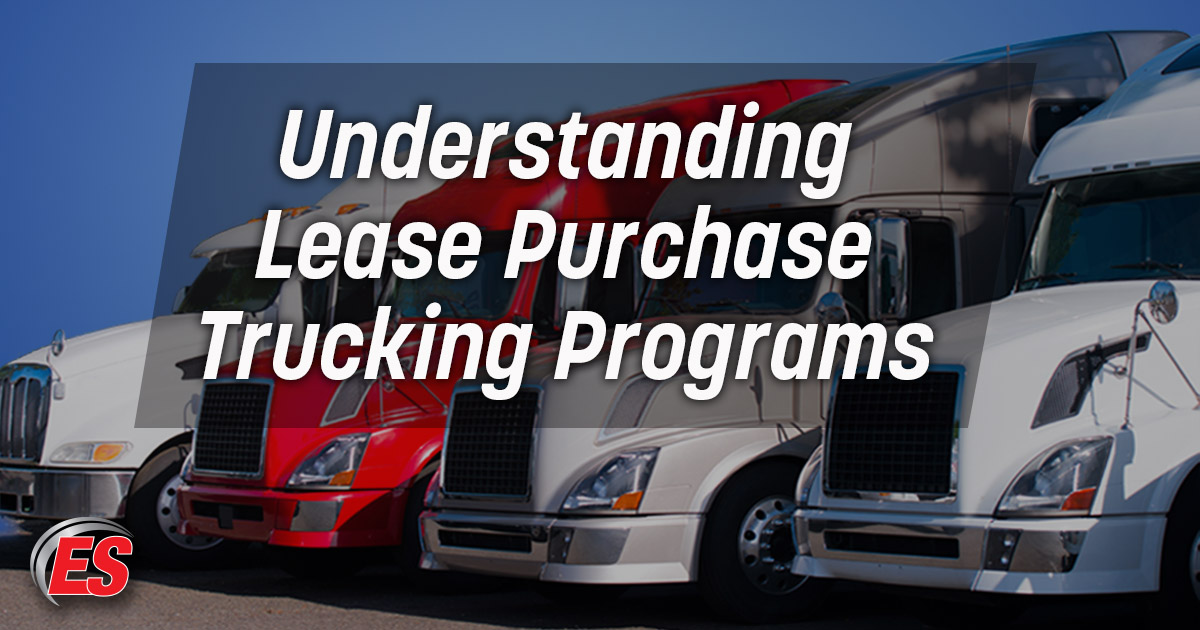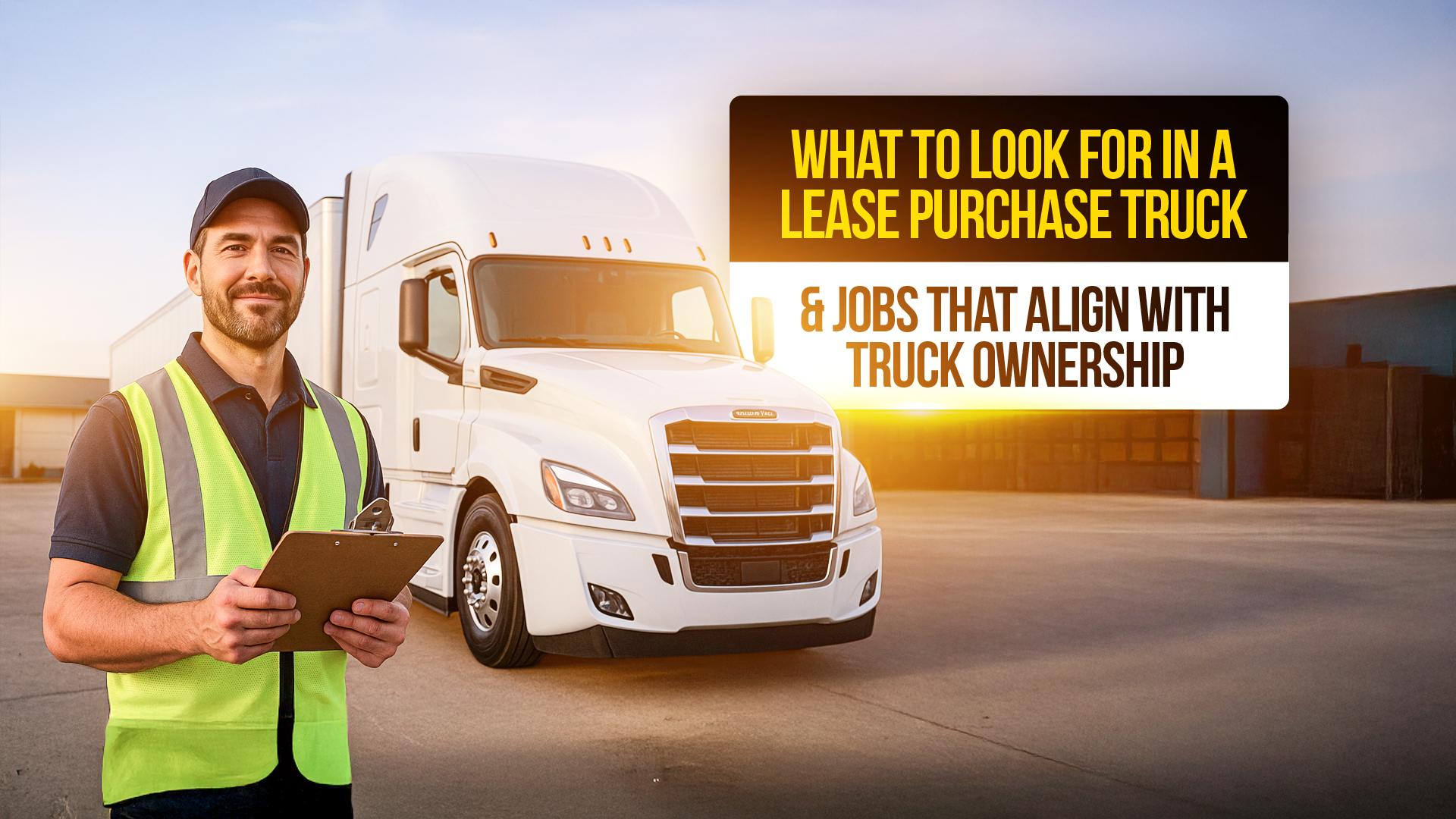Lease Purchase Trucking Programs: Your Path to Ownership
Lease Purchase Trucking Programs: Your Path to Ownership
For many truck drivers, the ultimate dream is to be their own boss, to own the rig they command, and to build a business that bears their name. But the steep upfront cost of a brand-new truck can feel like an insurmountable barrier. This is where lease purchase trucking programs come into the picture, offering a potential bridge from being a company driver to a full-fledged owner-operator. Essentially, these programs allow you to lease a truck from a carrier with a portion of your weekly earnings going toward eventually owning it. It’s a path that requires careful navigation, blending the grit of the road with the acumen of a business owner. Let’s break down exactly how these programs work, their undeniable benefits, the potential pitfalls you must avoid, and how to select the right partner to make your ownership dream a tangible reality.
How Does a Truck Lease Purchase Program Actually Work?
Think of a lease purchase agreement as a long-term rental with an option to buy. You partner with a trucking company that provides the semi-truck. Instead of a simple driver’s salary, your compensation is structured to cover two things: your weekly income and a payment toward the truck’s purchase price.

Here’s a typical breakdown of the financial flow:
- Weekly Settlement: You are paid a rate per mile or a percentage of the load revenue.
- Lease Deduction: A fixed weekly amount is automatically deducted from your settlement to cover the truck lease payment.
- Additional Costs: On top of the lease payment, you are typically responsible for other expenses like fuel, tolls, and routine maintenance. This is a crucial point—you’re operating the truck as your own business within the larger company’s framework.
The agreement will specify a final buyout price. Once you’ve made enough payments to reach that price, or you save up to pay a lump sum, the title of the truck is transferred to you. The goal is that by the end of the term, you own a well-maintained truck free and clear.
The Allure: Key Benefits of a Lease-to-Own Truck Plan
Why would a driver choose this route? The advantages are significant and go beyond just getting behind the wheel of a new truck.
- Low or No Down Payment: This is the biggest draw. Most programs require a minimal initial investment compared to the tens of thousands needed for a traditional down payment at a dealership.
- Built-In Business Framework:
You get immediate access to the carrier’s freight network. You don’t have to spend your first year scrambling to find loads; the company’s dispatch does that for you, providing a more stable cash flow as you learn the ropes of business management. - Test Drive Your Future: A lease purchase program serves as a trial run for ownership. You get a real-world feel for the costs and responsibilities of running your own rig without the lifelong commitment of a massive bank loan.
- Potential for Higher Earnings: As you are paid on the load and not by the hour, your income is directly tied to your hustle and efficiency. Successful owner-operators on a good lease plan can out-earn company drivers.
Navigating the Pitfalls: What to Watch Out For
Not all truck lease purchase programs are created equal. The industry has its share of predatory agreements that can trap drivers in a cycle of debt. As an experienced truck reviewer, I’ve seen too many drivers get burned by not reading the fine print.
- The “Walk-Away” Clause: This is non-negotiable. You must understand the terms under which you can leave the agreement without catastrophic financial loss. If you’re forced to default, what are the penalties? A fair program will have a clear, manageable walk-away policy.
- Hidden Fees and Sky-High Buyout: Scrutinize the final purchase price. Some companies inflate this amount so much that ownership becomes nearly impossible. Ensure all fees—administration, processing, etc.—are transparent from the start.
- Forced Dispatch and Poor Freight: Be wary of carriers that force you to take low-paying loads or routes you don’t want. If the company controls your freight, they control your ability to make money. Look for a program that offers some flexibility and access to high-quality freight lanes.
- Maintenance Costs: Clarify who is responsible for what. A major engine repair can cost thousands. Know your potential liability upfront.
Lease Purchase vs. Company Driver vs. Traditional Loan
To make the best decision, you need to see how a lease purchase trucking path stacks up against the alternatives.
| Factor | Lease Purchase Program | Company Driver | Bank Loan (Owner-Operator) |
|---|---|---|---|
| Upfront Cost | Low | None | Very High (Down Payment) |
| Income Potential | High | Fixed / Lower | Highest |
| Business Control | Moderate | None | Full |
| Freight Security | High (Carrier Provides) | High | Low (You Must Find It) |
| Financial Risk | Moderate to High | None | Very High |
Choosing the Right Program: An Expert Checklist
John “Mack” Richardson, a transportation consultant with over 25 years of experience, advises drivers to be meticulous. “A lease-to-own truck deal is a marriage between you and the carrier. You wouldn’t get married on a first date, so don’t sign a contract after one conversation. Do your homework.”
Here is a practical checklist based on expert advice and industry best practices:

- Get Everything in Writing: Do not rely on verbal promises. The contract is the only thing that matters.
- Talk to Current Lease Operators: The best intelligence comes from drivers currently in the program. Ask the company for references and then ask those drivers tough questions about pay, support, and reliability.
- Calculate the Total Cost of Ownership: Add up the weekly payments over the full term, then add estimated maintenance, fuel, and insurance costs. Is the final number reasonable for the truck’s value?
- Review the Freight Board: Ask to see the types of lanes and rates the program typically offers. Ensure the freight is consistent and profitable enough to cover your costs and leave you with a livable income.
- Check the Company’s Safety Rating: A carrier with a poor CSA score can mean fewer loads and more headaches. Use the FMCSA’s Safety Measurement System (SMS) website to verify their record.
Frequently Asked Questions
Q: Can I really own the truck at the end of a lease purchase program?
A: Yes, but success depends entirely on the terms of your specific agreement and your ability to run the truck profitably. A transparent and fairly structured program is designed to lead to ownership.
Q: What is the typical weekly payment for a lease purchase truck?
A: Payments can vary widely based on the truck’s value and the lease term, but they often range from $500 to $1,200 per week. Remember, this is just the truck payment and does not include your other operating expenses.
Q: What happens if the truck breaks down? Who pays for repairs?
A: This is a critical question to ask before signing. In some programs, the carrier covers major repairs; in others, you are responsible. Always clarify maintenance responsibilities for both routine service and unexpected major failures.
Q: Is my credit score important for a lease purchase?

A: While these programs are generally more accessible than bank loans, many carriers will still perform a credit check. A better score can help you negotiate more favorable terms, but a less-than-perfect score doesn’t always disqualify you.
Final Thoughts: Is This Your Path?
A lease purchase trucking program is not a get-rich-quick scheme. It is a serious financial commitment that demands business savvy, discipline, and a lot of hard work. However, for the driver who is educated, prepared, and partners with a reputable carrier, it remains one of the most viable paths to achieving the dream of truck ownership. Do your due diligence, ask the hard questions, and you can turn the key on not just a truck, but on your own future.
Sources and Further Reading
To ensure the accuracy and authority of this information, we referenced the following resources:
- Federal Motor Carrier Safety Administration (FMCSA). “Safety Measurement System (SMS).” https://ai.fmcsa.dot.gov/SMS/
- American Trucking Associations (ATA). “Industry Data & Trends.” https://www.trucking.org/
- Owner-Operator Independent Drivers Association (OOIDA). “Lease-Purchase Agreements.” https://www.ooida.com/









